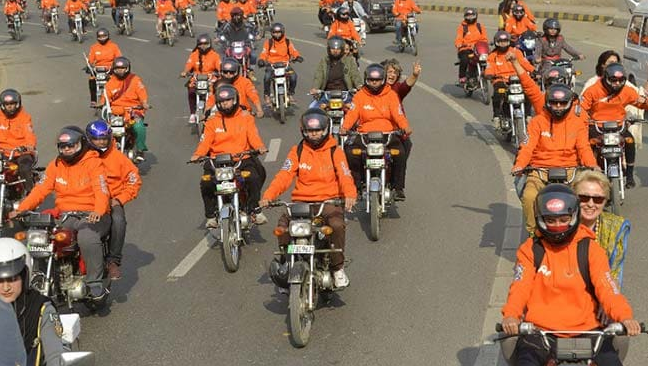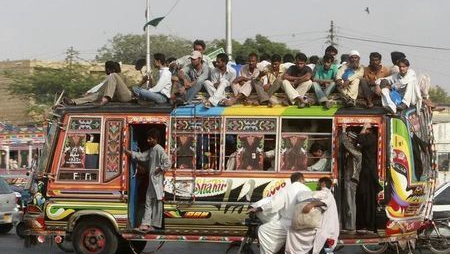A mobility initiative is helping women by providing them with an alternative to public transport in Pakistan, a country where women rely on a poor transport system or a male family member for their daily commute.
It opened in the country's largest city of Karachi, located in the south, last month after a successful launch elsewhere in the country.
The project was launched by the Salman Sufi Foundation with support from the government, UN Women, UN Development Programme, Japan, and ridesharing service Careem.
It was initially launched in different cities in the eastern province of Punjab and kick-started in Karachi, the capital city of the southern province of Sindh, in November.
Named "Women on Wheels" (WoW), the foundation said it is providing women with free motorcycle training lessons to increase their mobility and independence.

Women participants of the Women on Wheels (WOW) initiative ride their motorbikes during a rally launching the campaign in Lahore, January 10, 2016. /AFP Photo
Women participants of the Women on Wheels (WOW) initiative ride their motorbikes during a rally launching the campaign in Lahore, January 10, 2016. /AFP Photo
It is an initiative to empower women, it added. The foundation also provides subsidized motorbikes for women.
Since its launch in 2016, the program has already trained over 5,000 women in five districts of Punjab. Over 700 women have received subsidized motorbikes under the initiative.
"There are limited opportunities for safe mobility for women. They are either dependent on male family members or public transportation," Afia Salam, a Karachi-based journalist, told CGTN.
Being dependent on a male family member is seen as a burden, while using public transport opens the Pandora's box of harassment, expense, and unreliability, causing unnecessary stress, she explained.
"Harassment is grave, and rampant, and is one of the biggest hurdles in the way of mainstreaming of women in the place of work, and even educational opportunities," she added.
Afshan Khan, senior programs officer at women's rights organization Shirkat Gah's Karachi office, said harassment is a major issue which women face while traveling on crowded buses.
While praising the WoW program, she urged authorities to create more alternatives for women commuters.

A crowded bus with people even on its top travels in Karachi, Pakistan. /AFP Photo
A crowded bus with people even on its top travels in Karachi, Pakistan. /AFP Photo
How grave is Karachi's transport problem?
Karachi is Pakistan's largest city, with a population of 208 million. However, it is known for its weak transport system.
It is not just difficult for women to commute in the city, nearly everyone is, Sibte Arif, a Dubai-based journalist and Karachi native associated with Pakistan's Geo TV, told CGTN on Wednesday.
The situation is so dire that passengers can often be seen traveling on buses' roofs, risking their lives to get to work or school, he said, adding that it explains why alternative options, particularly for women, are necessary.
Karachi has been vying for transport solutions for years. One new plan, the Red Line Bus Rapid Transit Project, is now being finalized, for which the Beijing-based Asian Infrastructure Investment Bank approved a 71-million-U.S.-dollar loan.
It has a deadline of December 2023, local media reported in November. The bus line is reported to carry over 300,000 passengers daily.